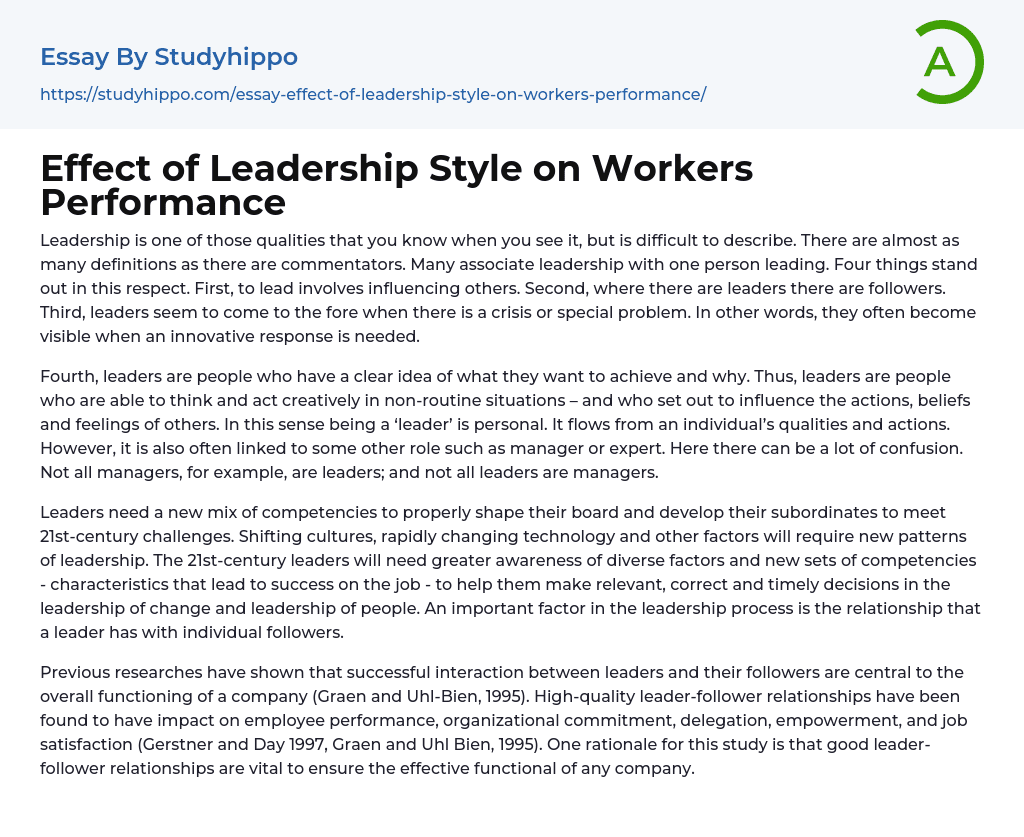Leadership is one of those qualities that you know when you see it, but is difficult to describe. There are almost as many definitions as there are commentators. Many associate leadership with one person leading. Four things stand out in this respect. First, to lead involves influencing others. Second, where there are leaders there are followers. Third, leaders seem to come to the fore when there is a crisis or special problem. In other words, they often become visible when an innovative response is needed.
Fourth, leaders are people who have a clear idea of what they want to achieve and why. Thus, leaders are people who are able to think and act creatively in non-routine situations – and who set out to influence the actions, beliefs and feelings of others. In this sense being a ‘leader’ is personal. It flows from an individual�
...�s qualities and actions. However, it is also often linked to some other role such as manager or expert. Here there can be a lot of confusion. Not all managers, for example, are leaders; and not all leaders are managers.
Leaders need a new mix of competencies to properly shape their board and develop their subordinates to meet 21st-century challenges. Shifting cultures, rapidly changing technology and other factors will require new patterns of leadership. The 21st-century leaders will need greater awareness of diverse factors and new sets of competencies - characteristics that lead to success on the job - to help them make relevant, correct and timely decisions in the leadership of change and leadership of people. An important factor in the leadership process is the relationship that a leader has with individual followers.
Previou
researches have shown that successful interaction between leaders and their followers are central to the overall functioning of a company (Graen and Uhl-Bien, 1995). High-quality leader-follower relationships have been found to have impact on employee performance, organizational commitment, delegation, empowerment, and job satisfaction (Gerstner and Day 1997, Graen and Uhl Bien, 1995). One rationale for this study is that good leader-follower relationships are vital to ensure the effective functional of any company.
- Being A Leader essays
- Servant Leadership essays
- Leadership Experience essays
- Leadership Qualities essays
- Board Of Directors essays
- Brand Management essays
- Business Ethics essays
- Business Management essays
- Change Management essays
- Comparative Analysis essays
- Decision Making essays
- Dispute Resolution essays
- Knowledge Management essays
- Leadership essays
- Leadership and Management essays
- Manager essays
- Operations Management essays
- Performance Management essays
- Product Management essays
- Project Management essays
- Quality Management essays
- Risk essays
- Risk Management essays
- Scientific Management essays
- Stress Management essays
- supply chain management essays
- Time Management essays
- Total Quality Management essays
- Code of Ethics essays
- Conflict essays
- Dress Code essays
- Human Resources essays
- Organizational Behavior essays
- Performance essays
- Recruitment essays
- Safety essays
- Abnormal Psychology essays
- Abraham Maslow essays
- Attachment Theory essays
- Authority essays
- Behaviorism essays
- Classical Conditioning essays
- Cognitive Psychology essays
- Counseling essays
- Developmental Psychology essays
- Educational Psychology essays
- Erik Erikson essays
- Family Therapy essays
- Jean Piaget essays
- Maslow's Hierarchy Of Needs essays




